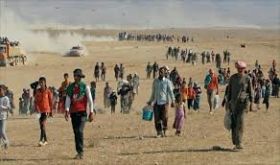1.8 Million have been displaced since January 2014, says UN

Baghdad (IraqiNews.com) Up to 1.8 Million, nearly half of them children – have been displaced since January 2014.
Despite ongoing violence and displacements across Iraq, UN agencies and humanitarian partners are responding to the ongoing humanitarian crisis with lifesaving programs, from Basra in the southeast of the country to Anbar province west of Baghdad, to Duhok in the Kurdistan Region of Iraq. The country is facing an escalating emergency with up to 1.8 million Iraqis displaced since January. This at-risk population requires shelter, basic humanitarian assistance and protection in over 1500 sites nationwide, surviving in often very harsh conditions.
Since the start of the initial massive displacement in Anbar governorate in January, UN agencies have been delivering emergency aid across all of Iraq – complementing efforts from local authorities to bring assistance to its people – in close cooperation with Iraqis and international non-governmental organisations (NGOs).
“It has been a challenging few months as the conflict has impeded and delayed some of our operations. However, the response by the humanitarian community has been steady and we are delivering humanitarian assistance in all major sites where displaced have moved. Just this week, less than 24 hours after the Amerli siege ended, tons of much-needed assistance came through to assist some 15,000 people. UN humanitarian agencies are committed to stay in the country, and do what it takes to bring relief to people in urgent need of assistance across all of Iraq,” said Jacqueline Badcock, the UN Humanitarian Coordinator in Iraq.
Thanks to generous donations in cash and in kind by donors, humanitarian organisation have been able to reach millions of Iraqis although security remains a major obstacle for sustained delivery of humanitarian aid in several areas of the country. More than 45 cargo flights have arrived recently in Erbil in the Kurdistan Region of Iraq, carrying 6,700 metric tons of tents, mattresses, hygiene kits, household kits, water bottles, water disaster response kits, and food donations, with a combined value of US$ 29 million.
Despite insecurity and the ongoing movement of people in August, UNICEF and the World Health Organisation (WHO) supported the Ministry of Health on a five-day campaign on a mass polio immunization campaign. The program reached 3.75 million children under the age of 5, and was part of the national response to the re-emergence of the poliovirus in Iraq earlier this year.
Overall, UNICEF has delivered assistance to 439,000 internally-displaced people since January with mainly water distribution and sanitation programs, including in central and southern Iraq, where the children agency has reached over 90,000 Iraqis.
Since the beginning of the crisis in June, WHO has also provided medicines and medical supplies for almost 950,000 beneficiaries across the country. The organisation supported 13 health mobile clinics in areas where internally displaced people are concentrated and recruited 220 health staff to cover shortages in personnel. WHO also helped to strengthen disease surveillance systems in all governorates to reduce the risk of disease outbreaks.
The UN refugee agency, UNHCR, has directly supported more than 300,000 displaced across all of Iraq’s 19 governorates since January. HCR is providing essential aid such as tents, mattresses, water jugs, hygiene kits, plastic sheeting and other emergency items. The protection teams have monitored needs and requirements for close to 150,000 people across Iraq, to ensure they receive the support they require. UNHCR is working in ensuring the displaced have access to shelter in camps, collective housing, and rehabilitated homes.
The International Organisation for Migration (IOM) runs programs in all of Iraq’s 18 governorates and operates three hubs, two of which cover central and southern Iraq in Baghdad and Basra, respectively. The organisation has distributed emergency items for IDPs since January to provide assistance for over 149,000 Iraqis, including the distribution of over 25,000 family kits, which include blankets, mattresses, storage bins, kitchen cookware, cutlery, cooking stove, laundry and toiletry items.
Through local partners, The UN Development Program (UNDP) is providing legal aid to refugees and IDPs in Dohuk, Anbar, Erbil, Sulaymaniyah and Basra. In the Governorate of Dohuk, UNDP helps local authorities maintain environmental sanitation in 100 schools and communities which host large numbers of IDPs. The development agency is also drilling water wells to serve 1000 people in the new camp of Dawoodia.
Lastly, from June to August, the World Food Program (WFP) and the Food and Agriculture Organisation (FAO) have been addressing food insecurity, with WFP reaching over 838,000 people across Iraq. This month WFP successfully resumed food assistance to displaced families in Ramadi and Heet districts in the war-torn al-Anbar, Iraq’s largest governorate.
“Humanitarian assistance can only be a temporary solution for the challenges facing Iraq. The ongoing violence has shattered the lives of millions and made people fear for their lives. The solution to this lies with the Iraqi people pulling together to support an inclusive government for all Iraqis. Only through the combined efforts of the government, civil society, and the international humanitarian community, can the immediate humanitarian needs of Iraqis be met,” added Jacqueline Badcock.
UN agencies and partners call on all parties involved in recent violence in the country to respect humanitarian organisations, and give them full access to the communities in need of basic assistance. Aid organisations are committed to help all Iraqis regardless of their religious affiliations or ethnicity. /End/
